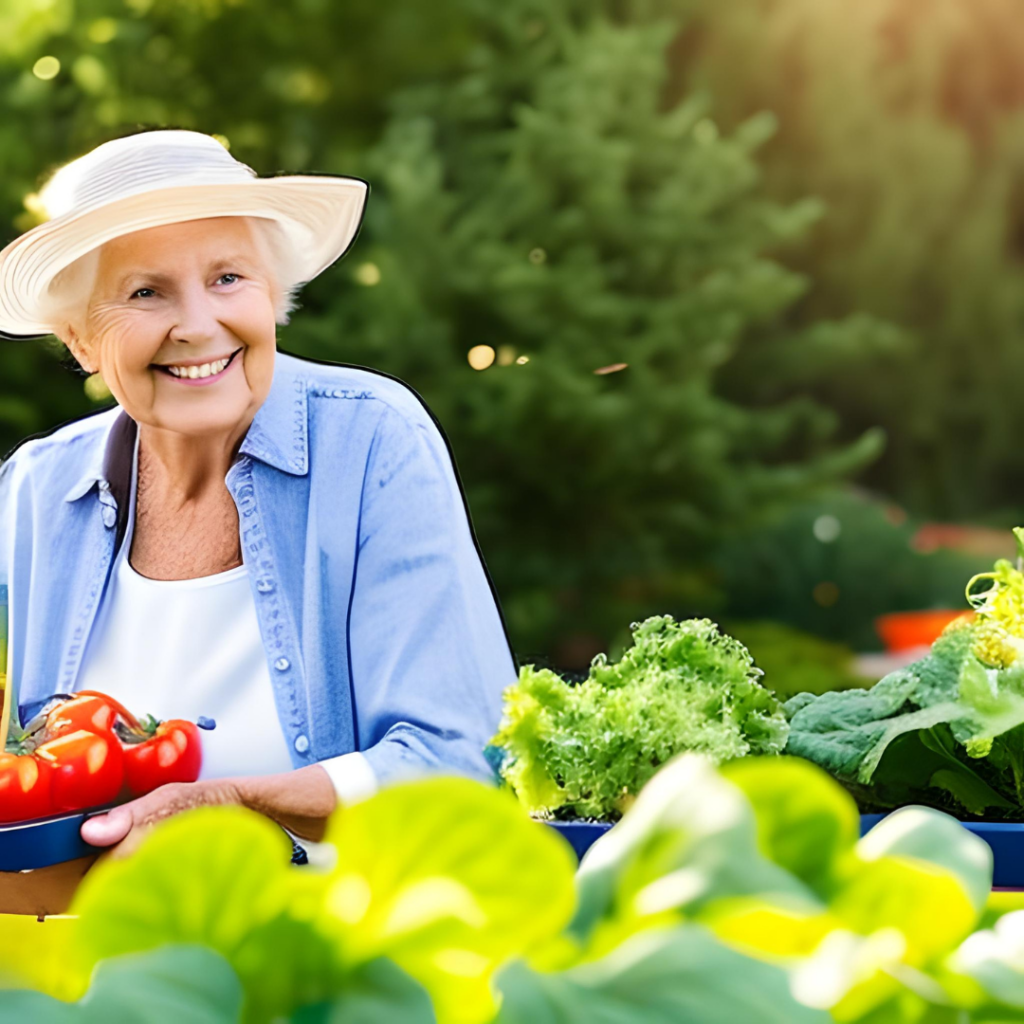Harvesting gardens for Seniors is a delightful and enriching activity. Additionally, the process of nurturing plants and enjoying the fruits of their labor enhances mental well-being, provides a sense of purpose and accomplishment, and offers access to fresh and nutritious produce.
Harvesting gardens involves employing four techniques such as raised garden beds for easy access and control, container gardening for flexibility, vertical gardening for space utilization, and adaptive tools to reduce strain. These techniques cater to Seniors’ needs and abilities, providing an enjoyable and accessible gardening experience.
The Therapeutic Effects of Senior-Friendly Gardens
Senior-friendly gardens provide a wide range of therapeutic benefits for older adults, encompassing both physical and mental well-being. Engaging in light gardening tasks such as planting, watering, and harvesting not only promotes physical activity but also enhances mobility, flexibility, and sensory stimulation. These gentle movements contribute to improved joint health and overall strength, supporting seniors’ physical vitality.
Beyond the physical aspects, spending time in nature within the serene environment of a garden has a profound impact on mental well-being. It serves as a natural antidote to stress, anxiety, and depression, offering a sanctuary of calm and rejuvenation. The connection with nature fosters cognitive function, enhancing memory, concentration, and overall mental clarity. Seniors can immerse themselves in the beauty of blooming flowers, vibrant greenery, and the soothing sounds of nature, finding solace and tranquility amidst their therapeutic garden oasis.
Techniques for Creating Senior-Friendly Gardens
- Raised Garden Beds:
Raised garden beds are a popular and effective technique for Seniors, offering a host of benefits. By elevating the gardening space, these beds eliminate the need for excessive bending or kneeling, making it more accessible for older adults with mobility challenges. Seniors can comfortably tend to their plants while standing or sitting on a stool or chair, reducing strain on their joints and back.
One of the advantages of raised garden beds is the increased control over soil quality and moisture levels. Seniors can customize the soil composition, ensuring optimal conditions for their plants’ growth. The elevated nature of the beds also helps with drainage, preventing waterlogging and ensuring the roots receive adequate moisture.
- Container Gardening:
Container gardening is a versatile technique that provides Seniors with the flexibility to cultivate plants in limited spaces or areas with mobility constraints. By utilizing pots, planters, or other containers, Seniors can create vibrant gardens on balconies, patios, or even indoors.
The ease of access and maintenance is one of the key advantages of container gardening. Containers can be placed at waist level or on tables, eliminating the need for excessive bending or kneeling. Seniors can comfortably tend to their plants, whether it’s watering, pruning, or harvesting, without putting strain on their bodies.
Container gardening also allows for better control over soil quality and drainage. Seniors can select the appropriate potting mix, ensuring the right balance of nutrients and water retention. Additionally, containers provide the opportunity to create visual interest by arranging different plants and flowers, adding beauty and color to any space.
- Vertical Gardening:
Vertical gardening is a smart technique that allows Seniors to maximize their gardening space while minimizing physical strain. By utilizing trellises, hanging baskets, or wall-mounted planters, Seniors can grow plants vertically, making efficient use of available areas.
One of the primary advantages of vertical gardening is its space-saving nature. Seniors with limited garden space or small balconies can still enjoy the benefits of gardening by utilizing vertical structures. Climbing plants, such as tomatoes, cucumbers, or beans, thrive in this setup, utilizing the vertical space effectively.
- Adaptive Tools:
Adaptive tools play a crucial role in making gardening easier and more enjoyable for Seniors. Specifically designed for their needs, these tools include ergonomic hand tools with cushioned handles and lightweight materials, reducing strain on joints and muscles. Additionally, long-handled tools and reach extenders provide assistance in accessing plants and tending to garden areas without requiring excessive bending or stretching, ensuring a comfortable gardening experience for older adults.
Benefits of Harvesting Gardens for Seniors
- Fresh and Nutritious Produce
Seniors can enjoy the fruits of their labor by harvesting homegrown produce. The joy of picking ripe tomatoes, crisp lettuce, or juicy berries can be immensely satisfying. Access to fresh, organic produce enhances nutrition and supports a healthy diet, leading to overall well-being.
- Sense of Purpose and Accomplishment
Engaging in gardening activities provides Seniors with a sense of purpose and accomplishment. Watching their plants grow and thrive instills a feeling of achievement and satisfaction. Seniors can take pride in their garden’s beauty and productivity, boosting self-esteem and mental well-being.
- Social Engagement
Gardening can foster social connections for Seniors. Community gardening programs, senior centers, or retirement communities often offer shared garden spaces where individuals can meet like-minded individuals, share knowledge, and form new friendships. Gardening becomes a shared passion and an opportunity for social interaction.
Creating a Senior-Friendly Garden Space
Designing a senior-friendly garden space involves considerations that prioritize safety, comfort, and sensory stimulation. By implementing the following elements, Seniors can enjoy a welcoming and accessible garden environment:
- Safety Considerations:
Ensure pathways are clear and well-maintained, with non-slip surfaces to prevent accidents. Adequate lighting enhances visibility during the evening hours, promoting safety and security in the garden. Removing any potential hazards such as sharp tools or tripping hazards further ensures a safe gardening experience for Seniors.
- Comfortable Seating Areas:
Incorporate comfortable seating areas within the garden, providing Seniors with spots to rest and enjoy the surroundings. Benches, chairs, or even garden swings offer opportunities for relaxation and contemplation, allowing Seniors to appreciate their garden oasis at their own pace.
- Sensory Stimulation:
Engage multiple senses by including elements of sensory stimulation in the garden design. Fragrant flowers like lavender or rosemary can provide pleasant scents, while wind chimes or bird feeders create soothing sounds. The visual appeal can be enhanced by selecting a variety of vibrant colors and textures in the plant selection. These sensory elements contribute to a serene and therapeutic garden experience for seniors.
By incorporating these safety measures, a senior-friendly garden space becomes a haven for older adults to connect with nature, experience tranquility, and find joy in the art of gardening.
Can seniors with limited mobility or physical challenges still participate in harvesting gardens?
Absolutely! There are various techniques and adaptations that make gardening accessible and enjoyable for individuals with different abilities. Raised garden beds, container gardening, vertical gardening, and adaptive tools are some of the options that allow Seniors to engage in gardening activities comfortably. With these approaches, seniors can experience the therapeutic benefits and sense of accomplishment that come with nurturing and harvesting their own plants.
Harvesting gardens not only offers physical and mental health benefits but also brings joy, a sense of purpose, and social engagement. Start today and witness the transformative power of gardening in the lives of Seniors. And if you or your loved ones require additional support, Anita’s Angels, Inc. is here to help with your in-home care services. Contact us at 908-788-9390. Remember, we are “Families Helping Families”.





